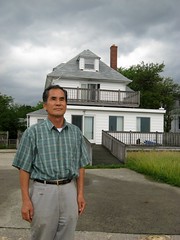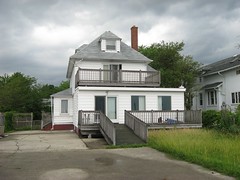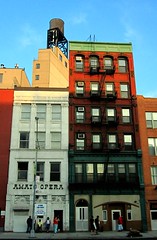 Michelle Rick Local theater producer John Kim (below) said that the owners of the Amato Opera promised that he could take over the theater when it closed in 2009. A long legal fight stemming from his falling out with the opera’s former owner is winding down.
Michelle Rick Local theater producer John Kim (below) said that the owners of the Amato Opera promised that he could take over the theater when it closed in 2009. A long legal fight stemming from his falling out with the opera’s former owner is winding down.As the curtain fell on the Amato Opera’s final performance in May 2009, many tears were shed and its eponymous founder received a standing ovation. But perhaps few in the audience knew that behind the scenes, a family feud had led to the end of the revered East Village opera house — a dispute that continues in court two years after the opera shut its doors.
Since the opera closed, a circuitous legal battle has ensued, which pits the charismatic owner of the opera, Anthony Amato, against his niece, Irene Frydel Kim and her husband, John Kim, who charge that Mr. Amato owes them more than 10 years worth of back wages, worth roughly $70,000. They also say in court papers that Mr. Amato owes them a portion of the $3.7 million he received through the 2009 sale of the opera building at 319 Bowery.
Mr. Amato counters that Ms. Kim misused money from a trust that he had established for her, and that she should repay the trust around $72,000.
This summer marks the end of one aspect of the dispute: under the terms of a court ruling late last year, the Kims have until September to vacate the City Island home that they once shared with Mr. Amato while helping him care for his ailing wife.
The ongoing legal wrangling has cast a cloud over the closing of the Amato Opera, which was previously portrayed publicly by Mr. Amato as inevitable, given that he is now 91.
Speaking about the matter on the record for the first time, Mr. Amato attributed his decision to close the opera to the lingering dispute with the Kims.
“I tried my best to turn it over to assistants but it wasn’t working. I just didn’t see any future in the opera the way I created it,” Mr. Amato said. “Nobody had the nerve to continue it.”
In an affidavit given in June 2010, Mr. Amato went even further, saying that Ms. Kim’s “seriously defective and unorganized” management of ticket sales and record keeping at the opera “was a major factor which lent itself to the ultimate demise of the company.”
At one point in the affidavit, Mr. Amato said that during a heated dispute over the rights to the City Island home Mr. Kim “began screaming at me and muttered under his breath that he wished I would die so that he could take over the property once and for all.”
In an interview, Mr. Kim deflected criticism of his management and record keeping and denied ever saying that he was awaiting Mr. Amato’s demise.
“Anyone who knows me, my manner — that’s not the kind of words I could think of,” Mr. Kim said.
This “opera within an opera” — as one former performer called it — began its final act several months before Mr. Amato announced he was closing the theater.
In 2009, Mr. Amato fired the Kims, who had worked for him — and lived with him — since 1999. A few months later, Mr. Amato closed the opera and sold the building for $3.7 million. Mr. Amato then began trying to evict the Kims.
The Kims took Mr. Amato to court, saying that he had no right to evict them from the home that they expected to inherit after their patron’s death — despite being removed from the family trust in 2009.
Mr. Kim, who is 70, said that his fall from grace came as a shock.
“We were thrown out,” said Mr. Kim as he stood in front of the Cape style home overlooking the Long Island Sound that he will soon be forced to leave. “It was like a bomb attack thrown at us.”
From 1962 to 2009, the Amato Opera, which shared a block of the Bowery with CBGB, was a popular part of the East Village art scene. Operating out of a 107-seat theater near Bleecker Street, the opera was an affordable alternative to larger-scale productions uptown, as well as a training ground for singers. The opera house was hailed as a feisty, quirky venue with neighborhood roots.
But to hear other volunteers who worked with Mr. Amato tell it, the final days of the opera were as dramatic behind the curtain as they were onstage.
“It’s a huge family feud, just the ugliest thing in the world,” said Nathan Hull, who worked for Mr. Amato and now runs the Amore Opera. “We stood aside in astonishment.”
It wasn’t always that way.
In 1998, Anthony and Sally Amato asked the Kims to move from Vermont into their home on City Island. In an affidavit, Ms. Kim says she and her husband had planned to live as a family, running the opera together and helping Mr. Amato care for his wife, whose health was in decline. Ms. Kim, who had worked as a child performer at the Amato Opera, answered the call of her relatives and moved to City Island.
But Ms. Amato’s health soon took a turn for the worse after a fall and, according to the affidavit, Ms. Kim and her husband spent the next year caring for Ms. Amato while also working for “virtually no compensation” at the opera. Ms. Amato died in August 2000.
Mr. Amato said that as a sign of his appreciation for the Kims, he established two trusts with them, as well as a joint brokerage account into which he deposited $500,000, according to court documents.
“The theater was promised to us, in the public, everywhere,” said Mr. Kim. “Everybody thought we would take over.”
Mr. Amato would not comment extensively on the details of the various court proceedings, citing ongoing litigation.
But he did acknowledge that he’d had a change of heart about the Kims taking over the opera.
“I just was not happy with their ideas of the future of the company,” said Mr. Amato. “It just wasn’t working out. The way they were working with the young singers wasn’t a happy situation, especially artistically.”
In May 2009, two months after the Kims were dismissed, the opera gave its final performance, Mozart’s “The Marriage of Figaro.” Mr. Amato then began divesting himself of the opera house and his City Island home, which was valued by an appraiser at $950,000; Mr. Amato now lives in a bungalow one block away.
A court ruling in October 2010 found that the Kims are entitled to a portion of the proceeds from the eventual sale of the house, but Mr. Kim is unsure how much money he and his wife will receive due to pending litigation that hinges upon their management of the trust.
And that’s not the only legal fight on the horizon. Mr. Kim is also seeking back wages from years of work at the Amato Opera.
“I am fighting back,” said Mr. Kim. “I’m claiming my wages from 10 years. I worked for $200 a week, about 12 to 16 hours of work a day.” he said.
Meanwhile, the former home of the Amato Opera remains for sale by its new owners; it’s listed at $6.95 million.







